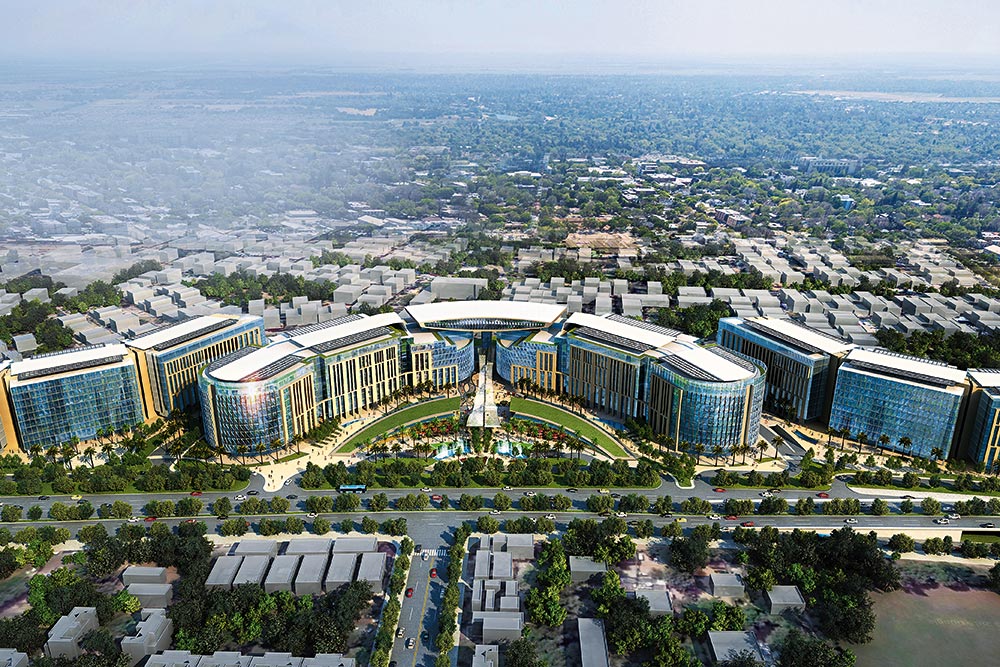It is ironic that a mason’s daughter, CMA Baldev Kaur Sokhey, is now Director (Finance) at NBCC, one of the largest state-owned construction companies in the country. It is equally tantalizing that goaded and encouraged by her mother, she became the only one among five siblings (three brothers and two sisters) to get a college degree (SRCC, Delhi University) and, later, a professional one. It is as if the father’s occupation, and mother’s desires nudged Sokhey on an exciting and satisfying professional journey. At NBCC, she took charge of mega and grand construction works, both in India and abroad.
According to its 2022-23 annual report, the company is “executing various mega projects such as World Trade Center, International Exhibition-cum-Convention Center, and Bharat Vandana Park. But a major highlight in the recent past are the sustainable, self-financing, and smart redevelopment projects across the Capital – New Moti Bagh, East Kidwai Nagar, Sarojini Nagar, Nauroji Nagar, and Netaji Nagar. Using CMA skills, Sokhey initiated a three-pronged strategy – monetize part of the project before the construction began, cut costs through innovative and sustainable tactics, and evolve an ecosystem that minimized expenses related to future maintenance.
For example, in New Moti Bagh, NBCC had to redevelop 100 acres to build a new campus comprising multi-story buildings, and bungalows. The company monetized three acres, which was sold to build hotels. “We raised Rs 600 crore, which was put into an escrow account. The entire construction cost of Rs 570 crore was financed through it. We even paid Rs 330 crore to the government, via a cheque,” explains Sokhey. Similarly, in Nauroji Nagar, which envisaged the building of 12 towers, NBCC has almost sold out the entire area at Rs 1,000 crore per tower, and generated money to finance the CPWD works.

At East Kidwai Nagar complex, the company set up a C&D waste recycling plant where, according to its annual report, “two million bricks were manufactured,” and “used in the project.” This saved huge costs, and improved the future viability. In another project, door-to-door collection of waste helped NBCC to treat it, and convert it into pellets, which were sold in the open market. This generated revenues, which part-financed the maintenance costs. The ultimate idea is to build projects that incorporate the best features related to waste management, energy consumption, and sustainable development.
In most projects, the company follows the Zero Waste concept. For instance, Delhi's New Moti Bagh complex is the largest IGBC certified Green Home Complex of its kind, and East Kidwai Nagar is a 'Zero Waste' sustainable colony. The latter has the capacity to process 100% waste and sewage at source. Treated water and manure generated is re-used. The ongoing projects at Nauroji Nagar, Sarojini Nagar and Netaji Nagar will incorporate, apart from zero waste, energy-saving measures such as installation of solar panels, LED/energy efficient lighting fixtures, and roof insulation to prevent heat inflow into buildings. In addition, there will be integrated systems to optimize energy intake, and smart parking management systems.
“We have the experience to build treatment plants to manage waste, and recycle water. We wish to experiment with solar panels, which require lots of space, by using the roof areas. When the Green Tribunal banned the cutting of trees for construction, and our project was delayed by 2-3 years, we not only complied with the orders, but planted more trees. This shows that our sustainable actions and decisions are driven by a mindset, and not just by costs and revenues. Given our experience, the Kerala Housing Board has recently awarded a large Rs 2,000-crore project to NBCC,” explains Sokhey.

Redevelopment aside, NBCC entered the segment to takeover distressed assets, or incomplete projects, and finish them. One of the prime examples is that of Amrapali, which was mandated under the guidance of the Supreme Court. “We held dozens of meetings, within NBCC, and among the stakeholders, to thrash out potential issues, and figure out solutions. Within the company, we analyzed inputs from different teams – engineering, finance, and legal. We worked out the cash flows, and completion schedule. We were under a tight deadline, as we had to submit a report to the apex court,” says CMA Sokhey.
Finally, NBCC went to the Court with an action plan and the Court agreed. NBCC has already sold 6,000 of the 8,000 units, largely because of the company’s credibility and brand name. The latter hopes to complete the project by December 2024. “This (distressed assets) is a new area for us. We are in discussions with Noida authorities to takeover some of the unfinished projects. We feel we have the requisite skills to make it a success,” adds Sokhey.
Another challenging area of business for NBCC and CMA Sokhey is the construction of secure border fences on the India-Pakistan and India-Bangladesh borders, and in several states in the North, North-East, and West. In many areas, other agencies were thwarted by rising insurgency in 2003-04. NBCC, which took over, faced several challenges. Most of the land in Kutch area was marshy, and roads were regularly swept away, or destroyed. Hence, innovative solutions were found – use stones and metal. “We completed the fencing. We built patrol roads, outposts, and culverts. In states like Arunachal Pradesh, Tripura, and Manipur, we built thousands of kms of border fencing. Later, in the North-East, we took on the task of building civic infrastructure like town halls, and vegetable markets. We minimized infiltration,” explains Sokhey.
Given that the government has embarked on an ambitious healthcare welfare scheme under Ayushman Bharat, NBCC has spotted opportunities in this sector. Its annual report states that the “company is the pioneer for the country's healthcare infrastructure and has undertaken the execution of several significant projects such as hospitals, medical colleges, health-care facilities.” But, for Sokhey, the roots of her achievements lie in her CMA skills.











